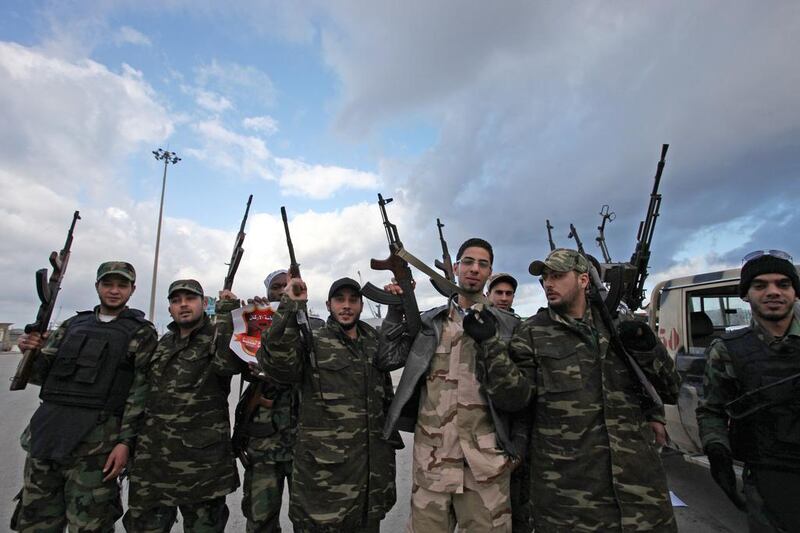GENEVA // Libya is awash with weapons because the international arms embargo is “almost nonexistent”, according to a United Nations report, which also says the flow of arms into the country is fuelling a war where ISIL is expanding its influence.
It highlighted the international community’s lack of action in tackling Libya’s spiralling chaos as rebel militias – which toppled Muammar Qaddafi in 2011 – turned on one another.
Released on the weekend, the report recommended naval patrols off Libya’s coast to halt the flow of weapons and said “safe areas” should be set up to protect Libyan civilians from a war that has killed thousands and forced 400,000 people to flee their homes.
A full-scale civil war was brought on last summer when the Libya Dawn militia coalition set up a rival government in Tripoli, and declared war on the internationally recognised house of representatives led by prime minister Abdullah Al Thani, which is based in Tobruk. Both are battling against ISIL units.
In the chaos, weapons sellers are making a fortune, said the report by a panel of experts set up by the UN to monitor the arms embargo.
It named companies in more than a dozen countries – including Belarus, Greece, Hungary, Ukraine and Turkey – that have been shipping tonnes of munitions to Libya’s rival factions despite the embargo.
Details were provided showing the transfer of Egyptian helicopters to help the Al Thani government.
The panel of experts said it was waiting for Italy to clarify reports that it had shipped weapons to Libya in 2011.
It also revealed that weapons sent by the European Union to its security guards – including 23 assault rifles and 43,000 bullets – were taken by a militia.
“Investigations indicate the material was stolen at Tripoli international airport following its delivery and that the militias controlling the airport were very likely responsible,” said the report.
Many of these weapons are now flowing out of the country and have “reinforced the military capacity of terrorist groups operating in different parts of the region, including Algeria, Egypt, Mali and Tunisia”.
The panel also blamed a “lack of action” from the United Nations Special Mission to Libya (Unsmil) for failing to provide safe passage for investigators trying to enter Libya to carry out inspections.
The report comes amid growing arguments over how to tackle ISIL, which now controls three towns in Libya and has threatened to take its war across the Mediterranean to Europe.
Following ISIL’s mass execution of 21 Egyptian Christians in Libya, few states are keen to offer peacekeepers.
Over the weekend, Mr Al Thani accused the British ambassador to the UN, Mark Lyall Grant, of bias after he said that “the only people fighting ISIL are actually the Misuratan militias”.
Misurata is one of the main forces of the Libya Dawn coalition. Mr Al Thani’s government said its forces were also battling ISIL in Benghazi and Derna.
Egypt has backed calls by Libya’s government for the UN to lift the arms embargo as a means of fighting ISIL, but other states fear new weapons would further escalate the war.
Britain and other western nations say the solution is a unity government.
“We would like to see a government of national unity formed as soon as possible,” said Mr Grant, who thinks it should be followed by “an agreement by the government of national unity to use the weapons they have”.
Unsmil envoy Bernadino Leon also favours a unity government. Although the UN threw its weight behind the elected government last summer, diplomats are now pushing for the government to make a deal with its unelected rebel foes.
While Unsmil attempts to persuade the rival parties to come together for peace talks, the war in Libya continues with ISIL set on expanding its influence.
foreign.desk@thenational.ae





